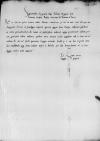Letter #2737
Sigismund I Jagiellon to Ioannes DANTISCUSBielsk Podlaski, 1544-06-15
| received Heilsberg (Lidzbark), 1544-06-26 Manuscript sources:
| ||||
Text & apparatus & commentary Plain text Text & commentary Text & apparatus
Reverendo in Christo Patri, domino
Reverende in Christo Pater, sincere nobis dilecte.
cf.
Quae bene valeat.
Dat(ae) or Dat(um)⌈Dat(ae)Dat(ae) or Dat(um)⌉
in
Ex commiss paper damaged⌈[ommiss]ommiss paper damaged⌉ione sacrae regiae maiestat paper damaged⌈[maiestat]maiestat paper damaged⌉is propria


 BCz, 1601, p. 494
BCz, 1601, p. 494